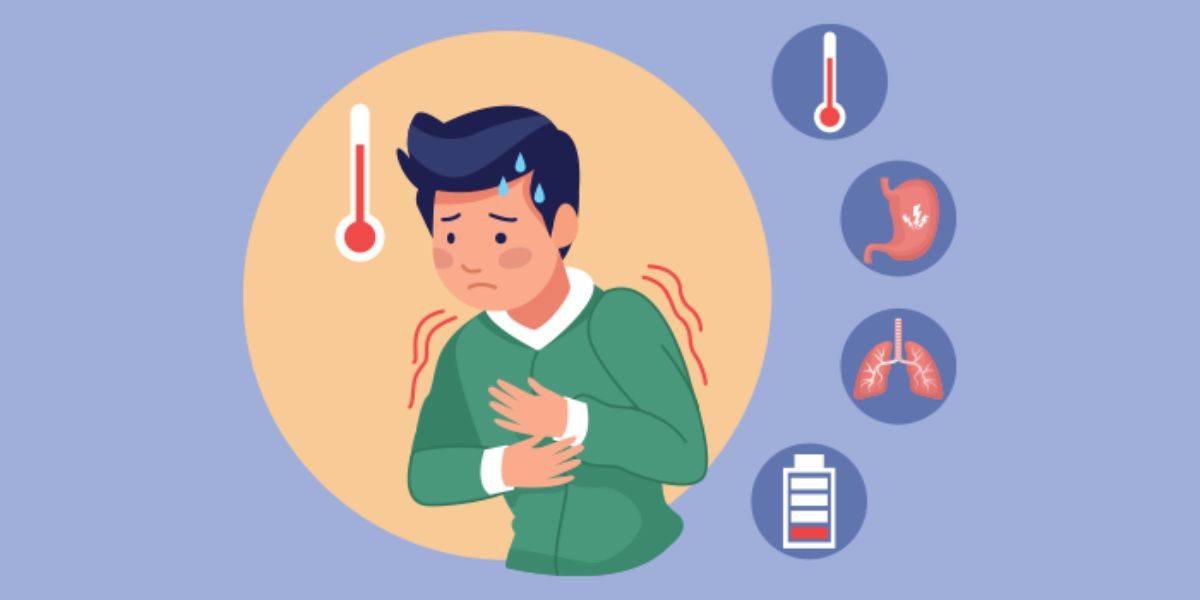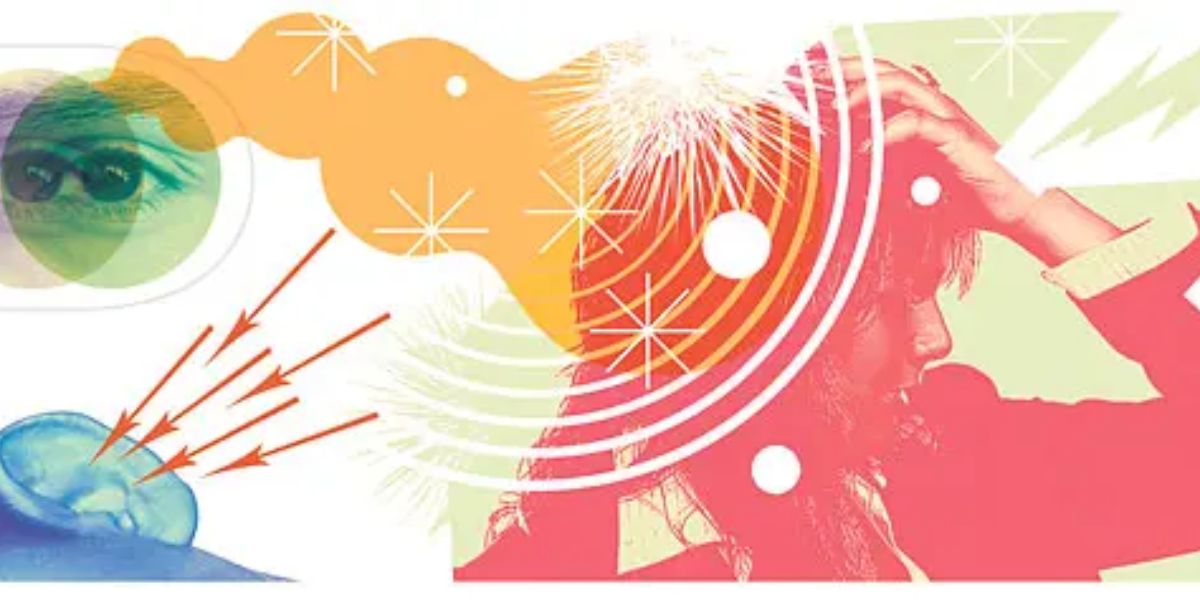It is remarkable that our bodies have the ability to communicate with us, and they do so frequently through oblique indications that things might not be quite right. It is possible that ignoring these indications, regardless of how little they may appear, could eventually result in more serious health problems in the future.
Despite the fact that it is natural to have the expectation that symptoms would disappear on their own, there are situations in which it is absolutely necessary to seek medical assistance. There are 10 indications that it is time to make an appointment with your physician, and they are as follows:
A Strong and Consistent Fever

In most cases, a fever is an indication that the body is fighting off an infection. It is important to pay attention to the temperature and duration of a fever. Because it may be an indication of a severe infection, a high fever (103 degrees Fahrenheit or above) demands rapid medical intervention.
In addition, a low-grade fever with a temperature between 100 and 103 degrees Fahrenheit that lasts for more than three days should trigger a visit to the doctor because it may indicate an underlying problem. It is also important to keep a close eye on symptoms in addition to fever, such as chills or difficulty breathing.
In many cases, treatment consists of first addressing the underlying problem, followed by the use of over-the-counter drugs to alleviate symptoms. Immediate medical evaluation helps to ensure an accurate diagnosis and suitable treatment, preventing any potential consequences that may arise.
A Cold That Becomes Worse
When a cold takes a concerning turn, it’s crucial to pay attention to symptoms beyond the typical sniffles and congestion. Chest pain may suggest underlying issues such as pneumonia or severe bronchitis, requiring medical evaluation. Shortness of breath could indicate compromised respiratory function, a red flag for conditions like pneumonia or even COVID-19, necessitating prompt attention.
Difficulty swallowing warrants investigation for potential complications like severe throat infections or respiratory distress. Loss of taste or smell, commonly associated with COVID-19, signifies viral involvement requiring monitoring and potential testing. Any cold persisting beyond two weeks warrants medical assessment to rule out exacerbations or complications, ensuring timely intervention and appropriate management.

Sudden Drop in Weight
Sudden weight reduction, particularly if it exceeds 10% of body weight in six months, requires attention, especially if it is not the result of deliberate efforts in obese people. It may indicate underlying health conditions such as diabetes, in which excessive blood sugar levels can result in fast weight loss. Thyroid problems, especially hyperthyroidism, may present with unexpected weight loss as a major symptom.
Furthermore, fast weight loss can be an early symptom of a number of dangerous problems, including cancer, gastrointestinal issues, and infectious diseases. Consulting a doctor as soon as possible allows for a complete evaluation, diagnosis, and quick therapy of suspected underlying health conditions, hence preventing complications.
Urgency of Severe Chest, Pelvic, or Abdominal Pain

Severe chest, pelvic, or abdominal discomfort requires quick attention since it often indicates life-threatening illnesses. Ignoring such pain may exacerbate underlying disorders and result in significant complications. Chest pain, for example, could signify a heart attack and require immediate medical attention to avoid cardiac damage.
Similarly, pelvic or abdominal pain could indicate illnesses such as gallstones or appendicitis, which necessitate rapid diagnosis and treatment to avoid complications such as organ failure or infection. Understanding the importance of acute pain allows people to prioritize their health and seek immediate medical attention for an accurate diagnosis and suitable treatment.

Identifying Vision Abnormalities Beyond Migraines
While migraines frequently cause visual disturbances such as flashes or auras, it is critical to pay attention to any such interruptions that occur outside of migraine episodes. Persistent bright flashes or vision disturbances may suggest underlying neurological problems or, more seriously, retinal detachment.
Unlike migraine-related visual disturbances, these episodes require rapid attention, as untreated retinal detachment can result in permanent vision loss. Recognizing the difference between migraine-related symptoms and potential signs of significant ocular or neurological problems enables people to seek timely examination from healthcare specialists, resulting in proper action and preservation of visual health.
Recognize cognitive and emotional changes as warning signs.
Brain fog, disorientation, trouble articulating thoughts, poor sleep, or unexpected mood swings should not be taken lightly. These symptoms may indicate underlying health difficulties ranging from acute diseases like stroke to more subtle concerns such as drug interactions or growing mental health disorders.
When experiencing these abnormalities, seek quick medical assistance to ensure proper diagnosis and appropriate response. Whether dealing with the urgency of a stroke or negotiating complex drug combinations, early medical assessment ensures optimal therapy and promotes general well-being. Individuals who recognize these cognitive and emotional changes as warning indicators can prioritize their health and receive the required assistance and treatment.
Monitor Bowel and Urinary Habits for Health Changes
Changes in bowel or urine patterns are important signs of underlying health changes that require quick medical treatment. Blood in urine or black, tarry stools may suggest gastrointestinal bleeding, although pain during elimination may indicate hemorrhoids or inflammatory bowel disease.

Prolonged diarrhea or constipation may indicate gastrointestinal distress or other systemic disorders that necessitate evaluation. Regular monitoring and prompt reporting of these changes to healthcare providers allows for early detection and action, which aids in the diagnosis and management of potential health issues.
Individuals who prioritize proactive health assessments can treat new difficulties quickly, thereby improving their overall health.
Recognizing signs of a concussion and prioritizing immediate care
Following a head injury, detecting suspected concussion symptoms is critical for assuring timely care and avoiding subsequent issues. Symptoms such as confusion, mood swings, nausea, or vision issues should not be neglected because they may suggest underlying brain damage that requires immediate evaluation.
Seeking immediate treatment at an emergency facility is critical for undergoing necessary diagnostic scans and receiving appropriate medical assistance. Concussions should be diagnosed and managed as soon as possible to limit the risk of long-term neurological effects and facilitate optimal recovery. Individuals can protect their brain health and well-being by seeking immediate care in the event of a concussion.
Unexpected symptoms after procedures or medication initiation
Following vaccines, surgical operations, or the start of new medications, it is critical to monitor for unexpected symptoms, as side effects can occur. Any unexpected symptoms, such as rashes, a fast heartbeat, nausea, loss of appetite, or inexplicable pain, require quick medical attention. These indications may suggest bad reactions or consequences that necessitate immediate evaluation and treatment.
Individuals who promptly notify healthcare providers of such symptoms help to promote timely assessment and management, reducing possible dangers and guaranteeing optimal treatment outcomes. Prioritizing proactive contact with medical professionals improves safety and well-being in the face of unanticipated health issues.
Shortness of Breath
While shortness of breath can be caused by high elevations or fat, abrupt and persistent onset necessitates careful consideration. If breathlessness persists beyond normal conditions or activities, it may suggest underlying cardiac or lung concerns that necessitate medical attention. Prompt attention to persistent shortness of breath is critical for successfully detecting and treating suspected heart or respiratory disorders.
Whether monitoring cardiac function or investigating pulmonary health, obtaining prompt medical attention assures proper management and promotes respiratory health. Recognizing the significance of sudden breathlessness allows people to prioritize their health and get the medical attention they need for good respiratory function.
Persistent Lower Back Pain
Maintain a firm grip. The single most prevalent complaint in primary care is low-back pain. In almost all cases, the cause of this discomfort is described as musculoskeletal strain, and the primary “treatment” for this condition is rest.

In the event that the pain is so severe that it prevents you from sleeping, your physician may suggest over-the-counter pain medicines or Tylenol #3 with codeine, which is a narcotic. Pain often disappears after four to six weeks; however, if it continues to be present for more than six weeks, it may be persistent low-back pain, which is something that should be evaluated by a medical professional.
Red flag: Pain or tingling down one leg or the other may be an indication of a slipped or herniated disk, or a pinched nerve root (sciatica), both of which require medical attention. Patients should seek medical attention immediately.
You Are Unable to Sleep
See your doctor if it persists after approximately two weeks have passed. People do not take their sleep seriously enough and are unaware that there are a lot of things that can be done to improve the quality of sleep they get. There is no better place to begin than with your primary care physician, who may either assist you with modifying your sleeping patterns or, if necessary, recommend you for additional assistance.
There are a few warning indicators that should be taken into consideration: having trouble falling asleep could be an indication of worry; getting up early in the morning is frequently linked to depression; and waking up intermittently throughout the night could be linked to another medical problem. The inability to get enough sleep can have a significant impact on functioning; thus, if the problem persists for more than two weeks, you should get assistance as soon as possible.
Depression
What is the frequency? There are times when everyone has feelings of depression; but, if your moodiness is causing problems at work, with family, or with friends, you should not be afraid to seek the advice of your primary care physician. As per research, the capacity of each individual to deal with difficult situations, such as the death of a loved one or other sources of stress, varies. The general rule of thumb is to bring it up sooner rather than later. “Primary care doctors are absolutely prepared and trained to treat minor to major depression—or refer patients on for additional treatment as needed.”
If you or a friend observe that your mood is interfering with your daily routine, or if you are experiencing more serious warning signs, such as having suicidal thoughts, it is considered a red flag and you should get assistance.
Diarrhea
Diarrhea on occasion is not an unusual occurrence. In most cases, it is not harmful and does not indicate that there is a problem. However, there are indicators that should be looked for that might point to a problem. These include the following:
- Diarrhea that continues for longer than three days
- Stools that are dark and tarry
- Your stool contains blood.
- Abdominal discomfort that is severe
Indications of dehydration include sensations of extreme dryness in the mouth or skin, weariness, decreased urine, disorientation, or irritability.
Problems with menstruation

A woman’s monthly menstruation can have a significant influence on her life, particularly if there are complications associated with it. Get in touch with your physician if you are suffering any of the following symptoms:
- All of a sudden, your period starts to become erratic.
- It has been at least three months since you last had a period.
- There is bleeding that occurs in between periods.
- You are experiencing a period that is significantly heavier than usual or that lasts significantly longer than usual.
- Severe or incapacitating cramps are affecting you.
You have been experiencing muscle pain for more than a week
Take your time. Consider your first CrossFit session as an example of the benign sort of muscle soreness that will disappear on its own within a few days. This type of muscle soreness is caused by physical activity that the body is not adapted to, and it should be avoided. To alleviate the symptoms, Lickerman suggests that you try pain medicines that are available without a prescription, such as Tylenol or Advil.
If the pain persists for more than a week (or if your muscles continue to hurt even while you are resting), you should make an appointment with your primary care physician to see whether or not there is a more serious issue. Although it is extremely uncommon, rhabdomyolysis can be brought on by abnormally strenuous activity. If the condition is not treated, it might result in irreversible damage to the kidneys.
Conclusion
Finally, if you see any of these signs or symptoms, you should pay attention to your body and seek medical assistance immediately. Early detection and action can frequently result in better outcomes, so don’t hesitate to speak with a healthcare expert if you have any concerns about your health. Your health deserves to be prioritized, and obtaining medical assistance when necessary is an important step toward living a healthy and full life.










